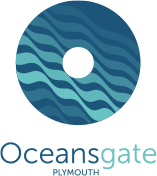Professor Kevin Jones, Executive Dean of the Faculty of Science and Engineering at the University, said:
“Through vessels such as CETUS and the Mayflower Autonomous Ship, the University is at the forefront of using unmanned vessels for cutting edge ocean science. This technology has the undoubted potential to be a game changer in the field, enabling us to capture data which can transform our understanding of the oceans and the impact climate change and other factors are having on them. It is also a fantastic opportunity for our students and staff, and the wider business community, to engage with the technology and develop new and innovative ways of applying it to their work.”
Rob Watson, Director of the Marine Business Technology Centre (MBTC), added:
“Granting free access to cutting edge technology assets such as CETUS is one of the most exciting elements of the Marine Business Technology Centre (MBTC). Combined with on-hand specialist expertise, the MBTC is offering Devon businesses a game-changing platform for collaborative research, development and innovation. CETUS will operate primarily within the Smart Sound Plymouth proving ground for advanced marine technology development and operations.”
The MBTC is a partnership led by Plymouth City Council with the University of Plymouth, the University of Exeter, Plymouth Marine Laboratory and the Marine Biological Association.
Councillor Tudor Evans OBE, Leader of Plymouth City Council, said:
“We created the MBTC to support local marine businesses, capitalising on our unique location with its incredible array of natural resources and providing access to innovative technologies that will help businesses to get ahead. It’s fantastic to see CETUS is now available to use, enabling even more ground breaking research to be carried out in Britain’s Ocean City.”
L3Harris is one of the world’s leading manufacturers of unmanned marine systems and its autonomous surface vehicle (ASV) business is based on the UK’s south coast.
Measuring just over 4metres long, and weighing ~680kg, its C-Worker 4 can travel at speeds of up to 7 knots and stay at sea for up to 48 hours. It is specifically designed to complete a variety of offshore and inshore tasks, and has a waterjet propulsion system which makes it an ideal solution for both shallow and deep water surveys.
Mark Exeter, Managing Director, ASV, L3Harris, said:
“The C-Worker 4 will enable businesses, staff and students to test equipment and explore exciting and innovative new technologies. It also establishes Plymouth as one of the leading providers of accessible unmanned technology to a plethora of new users. We were delighted the University of Plymouth selected L3Harris to deliver this unmanned vessel, and in recent months we have worked closely with them to deliver the system..”
Any Devon businesses interested in finding out more about accessing the C-Worker 4 can contact University of Plymouth Knowledge Exchange Officer Steven Rice at steven.rice@plymouth.ac.uk or by calling 01752 588301.
